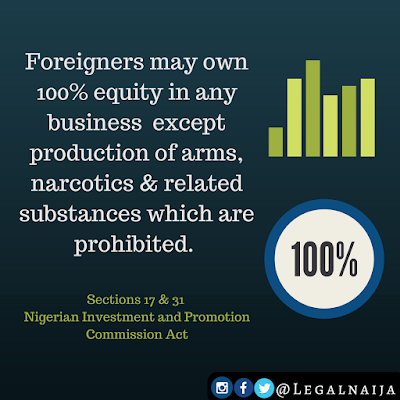
Compliance Under The Corporate Immigration Regime in Nigeria

Under the Nigerian corporate immigration regime, foreign
nationals may undertake any type of business and own 100 percent equity and
undertake any type of business in Nigeria except those in the negative list,
that is, production of arms, narcotics and related substances which are
prohibited to Nigerians and Foreign Investors alike.[1]
nationals may undertake any type of business and own 100 percent equity and
undertake any type of business in Nigeria except those in the negative list,
that is, production of arms, narcotics and related substances which are
prohibited to Nigerians and Foreign Investors alike.[1]
Only exempted foreign companies may carry on business in
Nigeria without incorporating a local entity. The application for exemption is
made to the office of the Secretary to the Federal Government.[2]
Nigeria without incorporating a local entity. The application for exemption is
made to the office of the Secretary to the Federal Government.[2]
Relevant Permits –
Foreign
businesses hoping to carry out business in Nigeria must incorporate a local
entity in Nigeria with a minimum share capital of ten million naira (N10,000,000.00).
The company is required to have at least 2 shareholders (they may be
corporations or individuals) and 2 directors.
businesses hoping to carry out business in Nigeria must incorporate a local
entity in Nigeria with a minimum share capital of ten million naira (
The company is required to have at least 2 shareholders (they may be
corporations or individuals) and 2 directors.
Once
the company has been incorporated and obtained the Certificate of Incorporation,
issued by the Corporate Affairs Commission (“CAC”),
the company can then apply to the Federal Ministry of Interior (“the Ministry”) for a business permit,
which licenses the entity to carry on business in Nigeria.
the company has been incorporated and obtained the Certificate of Incorporation,
issued by the Corporate Affairs Commission (“CAC”),
the company can then apply to the Federal Ministry of Interior (“the Ministry”) for a business permit,
which licenses the entity to carry on business in Nigeria.
Once
the Ministry has granted the business permit, the entity is then required to
apply to the Ministry for an expatriate quota. The expatriate quota enables the
company to employ foreign nationals to positions that have been approved by the
ministry which are listed out on the expatriate quota itself. It is noteworthy
that the expatriate quota which is usually granted for a period of 2 – 3 years
(subject to the discretion of the ministry), clearly states that for every
expatriate position occupied by a foreign national there must be at least 2
Nigerian nationals understudying the foreign national. It is always advisable to commence renewal
of the expatriate quota at least 4 months before the expiry date.
the Ministry has granted the business permit, the entity is then required to
apply to the Ministry for an expatriate quota. The expatriate quota enables the
company to employ foreign nationals to positions that have been approved by the
ministry which are listed out on the expatriate quota itself. It is noteworthy
that the expatriate quota which is usually granted for a period of 2 – 3 years
(subject to the discretion of the ministry), clearly states that for every
expatriate position occupied by a foreign national there must be at least 2
Nigerian nationals understudying the foreign national. It is always advisable to commence renewal
of the expatriate quota at least 4 months before the expiry date.
Relevant Visas
·
Prospective
foreign nationals who have been employed on long term basis by companies duly
incorporated in Nigeria, usually arrive the company on a Subject to
Regularization (“STR Visa”) (the
application for the visa is usually made by the company in Nigeria to the Nigerian
Mission abroad).
Prospective
foreign nationals who have been employed on long term basis by companies duly
incorporated in Nigeria, usually arrive the company on a Subject to
Regularization (“STR Visa”) (the
application for the visa is usually made by the company in Nigeria to the Nigerian
Mission abroad).
Once in Nigeria the foreign national is expected to
regularize the visa within 90 days by making an application to the Nigerian
Immigration Service (“NIS”), this
process is called Regularization of Stay (“ROS”).
At the end of the of the regularization period the NIS issues the Combined
Expatriate Resident Permit and Aliens Card (CERPAC)
to the foreign national.
regularize the visa within 90 days by making an application to the Nigerian
Immigration Service (“NIS”), this
process is called Regularization of Stay (“ROS”).
At the end of the of the regularization period the NIS issues the Combined
Expatriate Resident Permit and Aliens Card (CERPAC)
to the foreign national.
·
Temporary Work
Permits (“TWP”): companies desirous
of bringing foreign individuals into Nigeria on short term basis can do so by
applying for a TWP visa. This is visa usually granted to companies desirous of
bringing foreign nationals into Nigeria for the purpose after sales installation
of machinery, maintenance services etc. The application is first made by
applying to the NIS, who issues a cablegram before the Nigerian Mission abroad
issues the visa.
Temporary Work
Permits (“TWP”): companies desirous
of bringing foreign individuals into Nigeria on short term basis can do so by
applying for a TWP visa. This is visa usually granted to companies desirous of
bringing foreign nationals into Nigeria for the purpose after sales installation
of machinery, maintenance services etc. The application is first made by
applying to the NIS, who issues a cablegram before the Nigerian Mission abroad
issues the visa.
· Business Visa:
This class of visa is granted to foreign nationals entering Nigeria for the
purpose attending meetings and conferences. Visitors on this visa are expressly
prohibited from taking up any form of employment in Nigeria.
This class of visa is granted to foreign nationals entering Nigeria for the
purpose attending meetings and conferences. Visitors on this visa are expressly
prohibited from taking up any form of employment in Nigeria.
· Under the E-pass
regime, visitors in Nigeria who are likely to overstay the duration of their
visa can apply for an extension in-country.
regime, visitors in Nigeria who are likely to overstay the duration of their
visa can apply for an extension in-country.
Local Content Laws
In
certain sectors of the Nigerian economy there are local content laws which all
companies must adhere to. The provisions of these laws range from giving
priority to Nigerian firms to encouraging locally made wares. These laws apply
mostly to the Oil and Gas as wells as the power sector.
certain sectors of the Nigerian economy there are local content laws which all
companies must adhere to. The provisions of these laws range from giving
priority to Nigerian firms to encouraging locally made wares. These laws apply
mostly to the Oil and Gas as wells as the power sector.
Monthly Expatriate Quota Returns
Every
company carrying on business in Nigeria with foreign nationals in its
employment is required to file to the NIS a monthly returns of expatriate quota
positions occupied and provide such details in these returns as may be
requested by the NIS. It is noteworthy to state that the quota returns is often
used by the Internal Revenue bodies as a means of reconciling the number of
expatriate employees employed by a company over a period of time for tax
computation purposes.
company carrying on business in Nigeria with foreign nationals in its
employment is required to file to the NIS a monthly returns of expatriate quota
positions occupied and provide such details in these returns as may be
requested by the NIS. It is noteworthy to state that the quota returns is often
used by the Internal Revenue bodies as a means of reconciling the number of
expatriate employees employed by a company over a period of time for tax
computation purposes.

Busayo Adedeji
Busayo advises clients on
corporate immigration issues, advising clients on employment and labour law
issues, ensuring that clients are in line with regulatory compliance rules,
civil litigation etc
corporate immigration issues, advising clients on employment and labour law
issues, ensuring that clients are in line with regulatory compliance rules,
civil litigation etc
Twitter:
@thestreetloya
